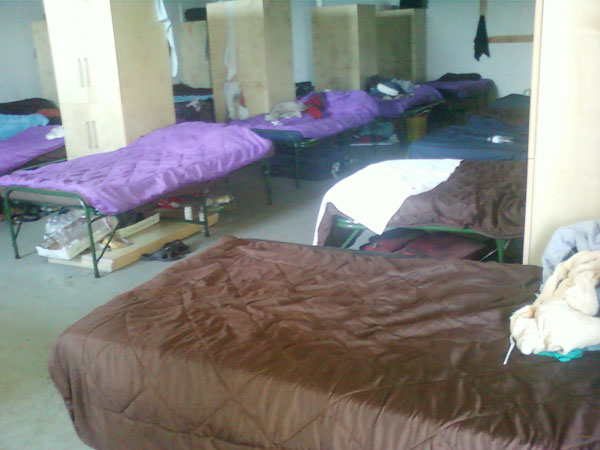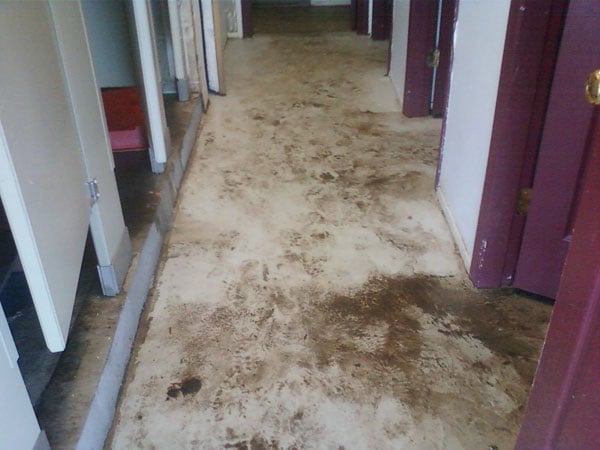Under the harsh light that floods a fast food restaurant at Vancouver International Airport, two small, wiry, dark skinned men in work clothes looked tired, worried and out of place among the other travelers eating around them. Because they fear retribution at home, the two Guatemalan farm workers asked The Tyee not to use their real names in telling their story. So, call them Pablo and Jose. Nor did they think it was safe to reveal the name of their employer, believing that could lead to their identities becoming known. Speaking haltingly through an interpreter, they said their jobs in an Okanagan orchard, arranged though Canada's Temporary Workers Program, had become such a nightmare they were now returning home early. Within hours they would be back in their country amidst the rural poverty that had motivated them to come north in the first place.
"I got a feeling of desperation in my heart," said Pablo. "We had dangerous working conditions and inhuman housing. We didn't live in a normal house. Forty-four of us lived in a warehouse. The other eight lived in a trailer nearby."
Pablo's and Jose's stories were translated for The Tyee by Lucy Luna, a worker with the Agricultural Workers Alliance storefront office in Abbotsford. Luna, born herself in Mexico, works in the United Food and Commercial Workers supported AWA as an organizer, and met Pablo and Jose during an organizing trip to the Okanagan. She invited The Tyee to meet the two men as they waited for their flight home to Guatemala. The Tyee also obtained three photographs of the conditions at the orchard the men described.
Jose nodded in agreement as Pablo talked about the two squalid bathrooms that served all 44 of the Latin American men housed in the metal-sided warehouse and the single stove and sink that was the only kitchen provided for all the workers.
"Where we slept was made of metal sheets and there was no air conditioning, so the thermometer went up to 38 degrees Celsius," he said. Both men said the water provided to the workers at the orchard was unsanitary, looking milky and smelling bad. They described difficulty sleeping in the warehouse, and being roused at 3 a.m. to harvest fruit in the cool of the night. This arrangement presumably worked to protect the cherries from damage during the harvest, but left the two men and their co-workers sleep deprived and working at the top of tall ladders in the dark.
"It was so hot we could not sleep and because we worked at night starting at 3 a.m. and finishing at 1 p.m., by the time we got home to sleep the heat in the warehouse was inhuman and did not allow us to rest so we remained up until the heat went down, giving us a few hours sleep before starting the new day at 3 a.m.," said Pablo.
"Work was dangerous because we worked standing up on a ladder," said Jose. "We were in the dark, extremely tired and on top of that we couldn't see the ground."
Sometimes, he said, he could hear sounds at ground level that he took for bears eating the cherries that fell from the tree while he worked.
BC beckoned with promise
The two men had come to Canada once before, to harvest vegetables in Quebec in 2010. The next year they were not chosen by the Guatemalan agency that recruits workers for the Low Skills Pilot Project of Canada's guest worker program, so at first they were happy to be picked to come to B.C. this year. Although their hourly wage in Quebec was a bit lower than they were paid this year in B.C. orchards, Jose and Pablo said the combination of crowded, unsanitary living conditions, dangerous work and harsh, disrespectful treatment from their employer in the end made it impossible for them to stay.
"I came to Canada to be able to support my family," Pablo said. Like his companion, Pablo rents a small plot of land at home and farms it, generating just enough income to break even. The two men have nine children between them, and they have depended upon income from work in Canada to fill in the gaps created by their lives as subsistence farmers.

While Canada has been bringing in temporary agricultural workers from the global south since 1966, the past decade has seen programs dramatically expanded, both in terms of the number of "guest workers" imported and the industries taking advantage of the programs and in terms of the number of source countries for the workers. Critics like the United Food and Commercial Workers, its Agricultural Worker Alliance and the Canadian Council for Refugees say that the programs are basically unfair, bringing in Third World workers to perform heavy, often dangerous work but denying them the right to stay and apply for permanent residence. And while they are in Canada, the critics say, the workers are often exploited by employers and unable to secure any protection from bad working conditions or abusive bosses.
'A perpetually vulnerable and exploited workforce'
According to a recent union-funded study, "in the past few years a disturbing trend has emerged within Canadian immigration policy which continues to fundamentally alter Canada's demographic makeup. This alteration is as a result of the drastic increase in the use of migrant workers. Under the current Conservative government, the federal Temporary Foreign Worker Program (TFWP) has expanded exponentially. The radical expansion of these categories encompasses workers in agriculture, food processing, manufacturing, construction, service, and hospitality industries, to name a few."
The report continues: "Moreover, to make up for the harsh inadequacies related to child care and the Canadian health care system, tens of thousands of workers are employed annually as Live-in Caregivers in private homes. According to Citizenship and Immigration Canada (CIC), in 2009 the number of permanent residents who entered Canada totalled 252,124. The number of migrant workers for same year was over 280,000. This data reflects a targeted shift from a governmental model favouring entry of permanent residents, whom would have equal access to legal rights and a path to citizenship, to migrant workers who are faced with precarious immigration status and more limited access to legal rights. The consequences of such a shift has inevitably created a perpetually vulnerable and exploited workforce."

The Tyee contacted Human Resources and Skills Development Canada, one of the two federal bodies jointly responsible for temporary foreign worker programs in this country to ask about how the kind of conditions Jose and Pablo described could be inflicted on workers. A media spokesperson replied by email, saying:
"The provinces and territories have primary responsibility for establishing and enforcing health and labour standards, such as safe working conditions, for all workers, including temporary foreign workers. However, both the federal and provincial/territorial governments have an interest and a role to play in the safe employment of temporary foreign workers. The Temporary Foreign Worker Program and the provinces and territories cooperate on measures and regularly share information to help improve the protection of temporary foreign workers. For example, both levels of government work in partnership to provide up-front information to employers and workers on provincial labour standards and to ensure that the working conditions offered to temporary foreign workers are consistent with Canadian standards."
That description doesn't match the experience described by two small, work weary and discouraged Guatemalan workers who arrived home early last week, having fled their Canadian employer just a few days before their former host nation celebrated Labour Day. ![]()
Read more: Labour + Industry
















Tyee Commenting Guidelines
Comments that violate guidelines risk being deleted, and violations may result in a temporary or permanent user ban. Maintain the spirit of good conversation to stay in the discussion.
*Please note The Tyee is not a forum for spreading misinformation about COVID-19, denying its existence or minimizing its risk to public health.
Do:
Do not: